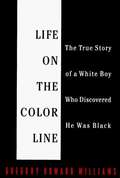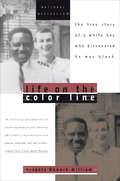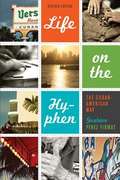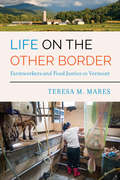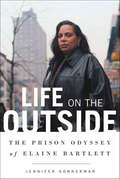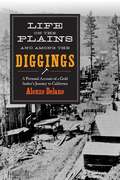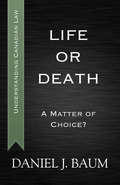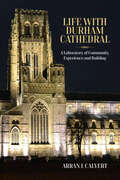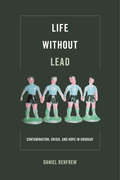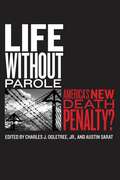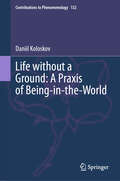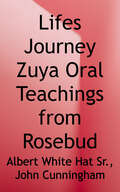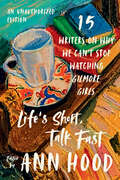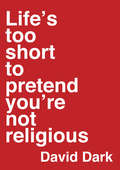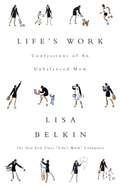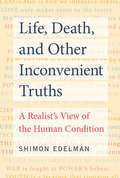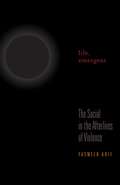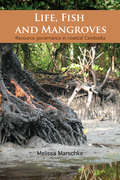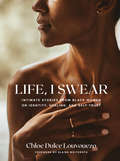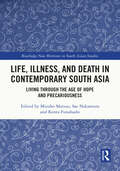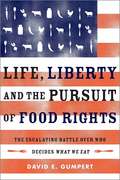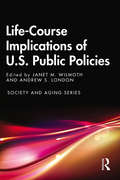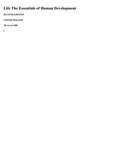- Table View
- List View
Life on the Color Line: The True Story of a White Boy Who Discovered He Was Black
by Gregory Howard WilliamsThe true story of a white boy who discovered he was black
Life on the Color Line: The True Story of a White Boy Who Discovered He Was Black
by Gregory Howard WilliamsAs a child in 1950s segregated Virginia, Gregory Howard Williams grew up believing he was white. But when the family business failed and his parents’ marriage fell apart, Williams discovered that his dark-skinned father, who had been passing as Italian-American, was half black. The family split up, and Greg, his younger brother, and their father moved to Muncie, Indiana, where the young boys learned the truth about their heritage. Overnight, Greg Williams became black. <P><P>In this extraordinary and powerful memoir, Williams recounts his remarkable journey along the color line and illuminates the contrasts between the black and white worlds: one of privilege, opportunity and comfort, the other of deprivation, repression, and struggle. He tells of the hostility and prejudice he encountered all too often, from both blacks and whites, and the surprising moments of encouragement and acceptance he found from each. <P><P>Life on the Color Line is a uniquely important book. It is a wonderfully inspiring testament of purpose, perseverance, and human triumph.
Life on the Hyphen: The Cuban-American Way
by Gustavo Pérez FirmatAn expanded, updated edition of the classic study of Cuban-American culture, this engaging book, which mixes the author's own story with his reflections as a trained observer, explores how both famous and ordinary members of the "1. 5 Generation" (Cubans who came to the United States as children or teens) have lived "life on the hyphen"-neither fully Cuban nor fully American, but a fertile hybrid of both. Offering an in-depth look at Cuban-Americans who have become icons of popular and literary culture-including Desi Arnaz, Oscar Hijuelos, musician Perez Prado, and crossover pop star Gloria Estefan, as well as poets Jose Kozer and Orlando Gonzalez Esteva, performers Willy Chirino and Carlos Oliva, painter Humberto Calzada, and others-Gustavo Perez Firmat chronicles what it means to be Cuban in America. The first edition of Life on the Hyphen won the Eugene M. Kayden National University Press Book Award and received honorable mentions for the Modern Language Association's Katherine Singer Kovacs Prize and the Latin American Studies Association's Bryce Wood Book Award. "
Life on the Other Border: Farmworkers and Food Justice in Vermont
by Teresa M. MaresIn her timely new book, Teresa M. Mares explores the intersections of structural vulnerability and food insecurity experienced by migrant farmworkers in the northeastern borderlands of the United States. Through ethnographic portraits of Latinx farmworkers who labor in Vermont’s dairy industry, Mares powerfully illuminates the complex and resilient ways workers sustain themselves and their families while also serving as the backbone of the state’s agricultural economy. In doing so, Life on the Other Border exposes how broader movements for food justice and labor rights play out in the agricultural sector, and powerfully points to the misaligned agriculture and immigration policies impacting our food system today.
Life on the Outside: The Prison Odyssey of Elaine Bartlett
by Jennifer GonnermanA groundbreaking work of reportage on the hidden consequences of America's prison boom Life On the Outside tells the story of Elaine Bartlett, who spent sixteen years in Bedford Hills prison for selling cocaine-a first offense under New York's harsh Rockefeller drug laws. The book opens on the morning of January 26, 2000, when she is set free, having received clemency from the governor. At forty-two, Elaine has virtually nothing: no money, no job, no real home.What she does have is a large and troubled family, including four children, who live in a decrepit Lower East Side housing project. "I left one prison to come home to another," Elaine says. Over the next months, she clashes with her daughters, hunts for a job, visits her son and her husband in prison, negotiates the rules of parole, searches for her own home-and campaigns for the repeal of the sentencing guidelines that led to her long prison term.In recent years, the United States has imprisoned more than two million people while making few preparations for their eventual release. Now these prisoners are coming home in record numbers, as unprepared for "life on the outside" as society is for them. Writing with a passion and an empathy that recall There Are No Children Here and Cold New World, Jennifer Gonnerman calls attention to this mounting national crisis by crafting an intimate family portrait-a story of struggle and survival, guilt and forgiveness, loneliness and love.Life on the Outside is a 2004 National Book Award Finalist for Nonfiction.
Life on the Plains and among the Diggings: A Personal Account of a Gold Seeker?s Journey to California
by Alonzo DelanoDuring the California gold rush, 300,000 prospectors flocked to California in the hopes of making it rich. Among them was Alonzo Delano, who set out alone at the age of forty-two, leaving his family behind in Illinois, both to seek out new opportunity and because of a doctor’s prescription for a western climate to help cure a lung ailment. He was, in his words, both seized by a "fever of the body” as well as a "fever of mind for gold,” and his hope was to cure both. Unlike many of the other gold rushers, Delano was a highly observant and literate man, and he wrote frequent correspondence back home that later became the book Life on the Plains and among the Diggings. In it, Delano recounts the incredible adventure to California, one that was filled with humor and equal parts unrivaled optimism and crushing tragedy; not all of the hopeful prospectors survived the journey. With keen, true-to-life observations and an eye for detail, Delano describes the trek past the northern plains, through the Wyoming wilderness, across the brutal Nevada Black Rock Desert, and finally into the promised land of California. He goes on to recount how he settles into a new life, becoming an influential writer. Life on the Plains and among the Diggings is an amazing, true story of adventure and a fascinating look at the brave pioneers who made America what it is today. Skyhorse Publishing, as well as our Arcade imprint, are proud to publish a broad range of books for readers interested in history--books about World War II, the Third Reich, Hitler and his henchmen, the JFK assassination, conspiracies, the American Civil War, the American Revolution, gladiators, Vikings, ancient Rome, medieval times, the old West, and much more. While not every title we publish becomes a New York Times bestseller or a national bestseller, we are committed to books on subjects that are sometimes overlooked and to authors whose work might not otherwise find a home.
Life or Death
by Daniel J. BaumA understandable overview of the laws regarding euthanasia, end-of-life treatment, and medication of those who may be unable to decide for themselves if the treatment is necessary. <p><p> Our bodies are ours to control, free from state interference — or so it appears. The Charter of Rights and Freedoms provides: “Everyone has the right to life, liberty and security of the person and the right not to be deprived thereof except in accordance with the principles of fundamental justice.” <p> But, how absolute is this? Do parents have the final decision in determining the medical care of their children, even if that choice may mean death? May children override the choices of their parents as to medical care? What role, if any, does the state (or the courts) have in reviewing individual medical choices, even if those choices are made by an adult but could result in death? Can physicians insist that their patients must have certain medical treatments? Do the terminally ill have the right to ask for assistance in dying? <p> These are among the questions upon which Canadian judges must rule. When and how they reach decisions are explored in Life or Death: A Matter of Choice?
Life with Durham Cathedral: A Laboratory of Community, Experience and Building
by Arran J. CalvertAn ethnographic account of daily life in Durham Cathedral, this book examines the processes of negotiation and change between a community and their cathedral. Focusing on the role of sound, light, time, space, building and dwelling, the author argues that Durham Cathedral is much more than just cannot merely be a backdrop to everyday life. Rather, through the constant processes of negotiation and change, it is a fully engaged participant in the daily lives of those who use Durham Cathedral. As such, it is not a place in which life happens, but a place with which life happens.
Life with Father
by Clarence DayA rich, uproarious book about family life, with amazing, amusing, warmhearted characters.
Life without Lead: Contamination, Crisis, and Hope in Uruguay (Critical Environments: Nature, Science, and Politics #4)
by Daniel RenfrewLife without Lead examines the social, political, and environmental dimensions of a devastating lead poisoning epidemic. Drawing from a political ecology of health perspective, the book situates the Uruguayan lead contamination crisis in relation to neoliberal reform, globalization, and the resurgence of the political Left in Latin America. The author traces the rise of an environmental social justice movement, and the local and transnational circulation of environmental ideologies and contested science. Through fine-grained ethnographic analysis, this book shows how combating contamination intersected with class politics, explores the relationship of lead poisoning to poverty, and debates the best way to identify and manage an unprecedented local environmental health problem.
Life without Parole: America's New Death Penalty? (The Charles Hamilton Houston Institute Series on Race and Justice #1)
by Charles J. Ogletree Jr. Austin SaratIs life without parole the perfect compromise to the death penalty? Or is it as ethically fraught as capital punishment? This comprehensive, interdisciplinary anthology treats life without parole as “the new death penalty.” Editors Charles J. Ogletree, Jr. and Austin Sarat bring together original work by prominent scholars in an effort to better understand the growth of life without parole and its social, cultural, political, and legal meanings. What justifies the turn to life imprisonment? How should we understand the fact that this penalty is used disproportionately against racial minorities? What are the most promising avenues for limiting, reforming, or eliminating life without parole sentences in the United States? Contributors explore the structure of life without parole sentences and the impact they have on prisoners, where the penalty fits in modern theories of punishment, and prospects for (as well as challenges to) reform.
Life without a Ground: A Praxis of Being-in-the-World (Contributions to Phenomenology #132)
by Daniil KoloskovThis book argues for the pragmatist thesis of the primacy of praxis on a phenomenological basis. Demonstrating the relevance of phenomenology, it provides a systematic overview of the contemporary pragmatic landscape, taking into account not only a family of neo-pragmatic approaches but also the current pragmatic readings of phenomenology. This volume offers an innovative formulation of the primacy of practice thesis based on the genetic reformulation of Heidegger’s notions of disclosure, Dasein, and average intelligibility (Das Man). Investigating the dynamic interrelation among those notions, the author arrives at the phenomenological conception of forms of life or average background practices and argues that a form of life is not a pragmatic condition of meaningfulness but an outcome of the dynamic process of meaning-formation. This text concludes that the formation of meaning has no overarching origin but sources from the bundle of disparate practical spaces, and is ‘anarchic’ in nature. It appeals to students and researchers working in phenomenology and philosophical anthropology.
Life's Journey - Zuya: Oral Teachings From Rosebud
by Albert White Hat"Our people are very lucky to be here," says Albert White Hat Sr. He has lived through a time when Indians were under government control, were sent to boarding schools, and were not permitted to practice their own rituals. <p><p>Now, although the Lakota people can practice their beliefs openly once again, things have changed, old ways have been forgotten. As a teacher at Sinte Gleska Tribal College in South Dakota, White Hat seeks to preserve the link the Lakota people have with their past. <p><p>In Life's Journey-Zuya, White Hat has collected and translated the stories of medicine men, retaining the simplicity of their language so as not to interpret their words through a Western lens. This is Zuya, oral history that is lived and handed down over the generations. In addition to the stories from the medicine men, White Hat shares stories from his own experience. Through anecdotes he shows not only how the Lakota lifestyle has been altered but also how Lakota words have begun to take on new meanings-meanings that lack their original connotations and generate a different picture of Lakota philosophy. <p><p>White Hat notes that the language, interwoven with history, tells the people where they came from and who they are. By setting the traditions and ceremonies down on paper, with the history of how they evolved, he has secured the meaning of these practices for current and future generations. Written with warmth and humor, Life's Journey-Zuya will be an enjoyable and enlightening read for the Lakota, the scholar, and the general public alike.
Life's Short, Talk Fast: Fifteen Writers on Why We Can't Stop Watching Gilmore Girls (An Unauthorized Edition)
by Ann HoodFifteen leading writers explore what Gilmore Girls means to them in this delightful celebration of a contemporary TV classic. Fast-talking, warm-hearted, and endlessly rewatchable, Gilmore Girls has bonded real-life mothers and daughters since 2000, when its iconic pilot introduced us to Lorelai, Rory, and their idyllic Connecticut town of Stars Hollow. More than twenty years later, it has become one of the most-streamed TV shows, ever. In an anthology as intimate and quick-witted as Gilmore Girls itself, best-selling author Ann Hood invites fifteen writers to investigate their personal relationships to the show. (“It’s a show? It’s a lifestyle. It’s a religion.”) Joanna Rakoff considers how Emily Gilmore helped her understand her own mother; Sanjena Sathian sees herself—and Asian American defiance—in Lane Kim; Freya North connects with her son through the show; Francesco Sedita discovers an antidote to pandemic loneliness; Nina de Gramont offers a comic ode to the unreality of Stars Hollow. For anyone who identifies as Team Logan, Team Jess, or even Team Dean, Life’s Short, Talk Fast reveals what Gilmore Girls tells us about ourselves—and why it matters. This publication has not been prepared, approved, or licensed by Warner Bros. Entertainment, Inc.; Warner Bros Television; or any other entity or individual associated with the creation or production of Gilmore Girls.
Life's Too Short to Pretend You're Not Religious
by David DarkFor many of us, the word "religious" immediately evokes thoughts of brainwashing, violence and eye-rubbingly tiresome conversations. Why not be done with it? David Dark argues that it's not that simple. The ease with which we put the label on others without applying it to ourselves is an evasion, a way of avoiding awareness of our own messy allegiances. Dark writes: "If what we believe is what we see is what we do is who we are, there's no getting away from religion." Both incisive and entertaining, Life's Too Short to Pretend You're Not Religious combines Dark's keen powers of cultural observation with candor and wit. With equal parts memoir and analysis, Dark persuasively argues that the fact of religion is the fact of relationship. It's the shape our love takes, the lived witness of everything we're up to for better or worse, because witness knows no division. Looking hard at our weird religious background (Dark maintains we all have one) can bring the actual content of our everyday existence—the good, the bad and the glaringly inconsistent—to fuller consciousness. By doing so, we can more practically envision an undivided life and reclaim the idea of being "religious."
Life's Work
by Lisa BelkinLife's Work is the story of one woman's search for balance -- and the realization that it can't be found. It is the story of modern motherhood, where true happiness is often reached when you finally give up and give in. A few years ago, while trying to make sense of her own hectic world, award-winning journalist Lisa Belkin was asked to write a very personal column for The New York Times. She called it "Life's Work" because it was about the intersection -- or, more accurately, the collision -- of life and work. Since then she's been inundated with stories of other people trying to catch their "balance": the CEO father-to-be who restructured his entire company so he would have time to see his baby, the divorced mom who thought she might have to give away the family iguana because the store that sold live food closed before she got home from work. But after hundreds of columns and thousands of reader e-mails, Belkin has yet to hear from a single person who has everything neatly under control. Finally, while trying to confer with her editor from a cell phone in her pediatrician's office, she reached an epiphany: No one can do it because it can't be done. With natural wit and hard-won wisdom, Belkin takes on the myth of the Supermom. Fans of her "Life's Work" columns will find them at the heart of this book, but they will also find the life lived behind those columns -- stories of her husband, who really deserves more attention; of her two young sons, who might eat more vegetables and fewer chicken nuggets if she had more energy; of her editors, who expect her to fit some work into a day filled with school plays and science projects; and of her mother, who is always happy to offer advice about how things used to be. The book that results is a conversation between a columnist and her readership, between a work-from-home mom and her generation. Lisa Belkin's Life's Work speaks to anyone trying to find meaning in a world where work has become life (and vice versa). Hers is the funny, poignant, and always dead-on story of trying to do it all...and learning that doing just some of it is enough.
Life, Death, and Other Inconvenient Truths: A Realist's View of the Human Condition
by Shimon EdelmanAn expert on happiness presents an engaging and inspiring guide to making sense of the human condition via brief essays on concepts from action, to love, to thought, to youth.This book offers a guide to human nature and human experience--a reference book for making sense of life. In thirty-eight short, interconnected essays, Shimon Edelman considers the parameters of the human condition, addressing them in alphabetical order, from action (good except when it's not) to love (only makes sense to the lovers) to thinking (should not be so depressing) to youth (a treasure). In a style that is by turns personal and philosophical, at once informative and entertaining, Edelman offers a series of illuminating takes on the most important aspects of living in the world.
Life, Emergent: The Social in the Afterlives of Violence (A Quadrant Book)
by Yasmeen ArifHow does an inquiry into life as it lives (or dies) amid mass violence look like from the perspective of the &“social&”? Taking us from Sierra Leone to India to Lebanon, Life, Emergent challenges conventional understandings of biopolitics, weaving a politics of life through the lens of life, not death. Arguing that the &“letting die&” element of biopolitics has been overemphasized, Yasmeen Arif zeros in on biopolitics&’ other pole: &“making live.&” She does so by highlighting the various means and the forms of life configured in the aftermath—or afterlives—of violent events in contexts of law, justice, community, and identity. Her analysis of the social repercussions is both global and local in scope. Arif examines the convictions made in the Special Court of Sierra Leone, the first hybrid court of its nature under international criminal law. Next, she explores the making of a justice movement in the context of Hindu–Muslim violence in 2002 in the state of Gujarat, India. From there she revisits the Sikh carnage in Delhi of 1984. Finally, she explores a span of civil violence in Lebanon, and particularly, its effects on the city of Beirut. This rigorously argued book brings together the various strands of life and the social that each chapter has disentangled—and in doing so it begins to frame a politics of, and in, life.
Life, Fish and Mangroves: Resource Governance in Coastal Cambodia (Governance Series)
by Melissa MarschkeIn Life, Fish and Mangroves, Melissa Marschke explores the potential of resource governance, offering a case study of resource-dependent village life. Following six households and one village-based institution in coastal Cambodia over a twelve-year period, Marschke reveals the opportunities and constraints facing villagers and illustrates why local resource management practices remain delicate, even with a sustained effort. She highlights how government and business interests in community-based management and resource exploitation combine to produce a complex, highly uncertain dynamic. With this instructive study, she demonstrates that in spite of a significant effort, spanning many years and engaging many players, resource governance remains fragile and coastal livelihoods in Cambodia remain precarious.
Life, I Swear: Intimate Stories from Black Women on Identity, Healing, and Self-Trust
by Chloe Dulce LouvouezoForeword by Elaine WelterothIn this stunningly illustrated essay collection inspired by the popular podcast Life, I Swear, prominent Black women reflect on self-love and healing, sharing stories of the trials and tribulations they’ve faced and what has helped them confront pain, heal wounds, and find connection. With essays by Eniafebiafe Isis Adewale • Lauren Ash • Gabrielle Williams • Lindsey Farrar • Nneke Julia • Elaine Welteroth • Meryanne Loum-Martin • Lili Lopez • Deun Ivory • Morgan Ashley • Dydine Umunyana • Adriana Parrish • Orixa Jones • Offeibea Obubah • Alex Elle • Kalkidan Gebreyohannes • Esther Boykin • Brooke Hall • Qimmah Saafir • Josefina H. Sanders • Julee Wilson • Shay Jiles • Danasia FantasticA mixture of poignant essays, gorgeous photography, and sophisticated design elements, Life, I Swear is a chronicle of transformation and growth by and for modern-day Black women. Some of today’s most influential Black female voices chronicle their private journeys, offering testimonies of living through pain and joy with raw honesty and unapologetic self-love.In each episode of her podcast, Life, I Swear, emotive storyteller Chloe Dulce Louvouezo explores the nuances of our diverse experiences. In one-on-one interviews and personal prose, the podcast centers on personal stories that offer universal insights into topics relevant to modern women’s lives, from identity and family to trauma and motherhood, told through the lens of Black women. A catalyst for change, this revelatory book builds on the premise of the podcast by diving deeper into themes of mental health, identity and resilience. Life, I Swear is sure to spark lively, thought-provoking, and necessary conversations that encourage Black women to return home to themselves through self-examination and grace. Life, I Swear features 100-125 full-color photographs throughout.
Life, Illness, and Death in Contemporary South Asia: Living through the Age of Hope and Precariousness (Routledge New Horizons in South Asian Studies)
by Mizuho Matsuo Sae Nakamura Kenta FunahashiThis book explores the experiential and affective dimensions of structural transformation in South Asia through contemporary and historical accounts of life, ageing, illness, and death. The contributions to this book include analyses from various regions in South Asia, and topics discussed uncover how people’s experiences of life, ageing, illness, and death are entangled with the technology of governance, biomedicine, neoliberal restructuring and other national/international policies. Structured in three parts – governance, technology, and citizenship; well-being and restructuring of the social; waiting, hesitation, and hope as attitudes in facing the precariousness and fundamental uncertainty of life – the book brings to light the ways in which people face and continue to engage with their own and others’ lives cautiously, waveringly, but with a sense of hope. A novel contribution to the study of how people struggle or navigate their lives through the conditions of inequity and precariousness in South Asia, this book will be of interest to researchers studying anthropology, sociology, history, medical and development studies of South Asia, as well as to those interested in cultural and social theory.
Life, Liberty and the Pursuit of Food Rights
by David E. GumpertDo Americans have the right to privately obtain the foods of our choice from farmers, neighbors, and local producers, in the same way our grandparents and great grandparents used to do? Yes, say a growing number of people increasingly afraid that the mass-produced food sold at supermarkets is excessively processed, tainted with antibiotic residues and hormones, and lacking in important nutrients. These people, a million or more, are seeking foods outside the regulatory system, like raw milk, custom-slaughtered beef, and pastured eggs from chickens raised without soy, purchased directly from private membership-only food clubs that contract with Amish and other farmers. Public-health and agriculture regulators, however, say no: Americans have no inherent right to eat what they want. In today's ever-more-dangerous food-safety environment, they argue, all food, no matter the source, must be closely regulated, and even barred, if it fails to meet certain standards. These regulators, headed up by the U. S. Food and Drug Administration, with help from state agriculture departments, police, and district-attorney detectives, are mounting intense and sophisticated investigative campaigns against farms and food clubs supplying privately exchanged food-even handcuffing and hauling off to jail, under threat of lengthy prison terms, those deemed in violation of food laws. Life, Liberty, and the Pursuit of Food Rights takes readers on a disturbing cross-country journey from Maine to California through a netherworld of Amish farmers paying big fees to questionable advisers to avoid the quagmire of America's legal system, secret food police lurking in vans at farmers markets, cultish activists preaching the benefits of pathogens, U. S. Justice Department lawyers clashing with local sheriffs, small Maine towns passing ordinances to ban regulation, and suburban moms worried enough about the dangers of supermarket food that they'll risk fines and jail to feed their children unprocessed, and unregulated, foods of their choosing. Out of the intensity of this unprecedented crackdown, and the creative and spirited opposition that is rising to meet it, a new rallying cry for food rights is emerging.
Life-Course Implications of US Public Policy (Society and Aging Series)
by Janet M. WilmothThere is a complex set of public policies and associated programs that constitute the social safety net in the United States. In Life-Course Implications of U.S. Public Policies, the authors encourage others to systematically consider the influence of policies and programs on lives, aging, and the life course, and how the consequences might vary by gender, race/ethnicity, sexual orientation, ability, and social class. The volume aims to foster an appreciation of how policy influences connect and condition the life course. Chapters examine issues relating to health, housing, food security, crime, employment, and care work, amongst other issues, and demonstrate how the principles of the life-course perspective and cumulative inequality theory can be used to inform contemporary public policy debates. Life-Course Implications of U.S. Public Policies will be a great resource for students of gerontology, sociology, demography, social work, public health and public policy, as well as policy makers, researchers in think tanks, and advocates, who are concerned with age-based policy.
Life: An Enigma, a Precious Jewel
by Daisaku IkedaThe Cosmos and Life, The Buddhist View of Life, Life and Death.
Life: The Essentials of Human Development
by Gabriela MartorellLife: The Essentials of Human Development is designed to be a brief but thorough account of human development from conception to death, exposing students to culture and diversity, and immersing them in practical application.
